Indie Beat: Richard Linklater - Idolizing A Slacker
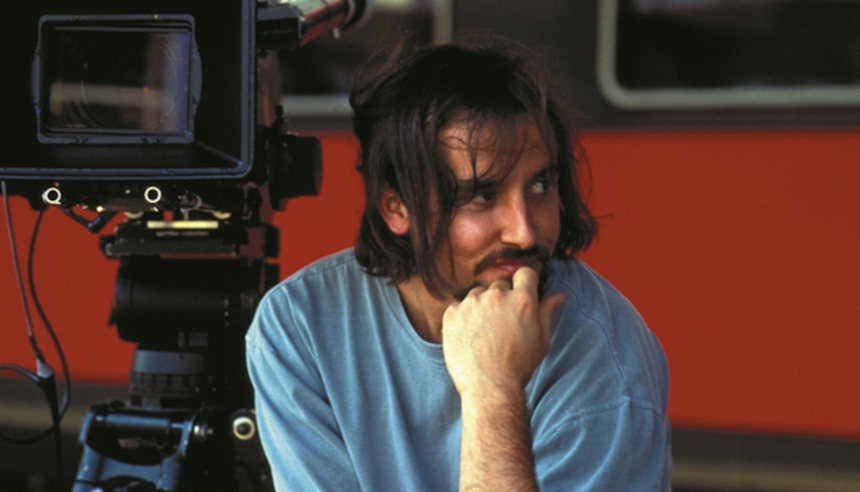
Over the twenty plus years of Linklater's career (another decade or so if you count his first steps in the 80s) this football player from Texas has traversed the line of the curious chameleon like few other American directors of his generation. You may know his work from the mainstream carpe diem-lite School Of Rock, the now seminal high school flick Dazed and Confused, the experimental animation Waking Life (a philosophical journey through dreams on into the unfathomable realms of reality itself and back again, which may, arguably be his most all-encompassing work, a bookmark for everything in his filmography that had come before and would come after), or like me, you became familiar with the name Linklater by way of Before Sunrise and Before Sunset: those two exceptional and exceptionally existential and romantic films where star-crossed lovers Jesse (Ethan Hawke) and Celine (Julie Delpy) walk and talk their way across European cities. The first, Before Sunrise, may be the most expounded upon take on the meet-cute ever to come from an American director, a film that is as fanciful and romantic as its follow-up is as sobering, grounded and yet still persistently able to come from a place of wonder.
And so, when the third entry in the story of Jesse and Celine came to American screens this past weekend I thought this would be the perfect time to talk about a director who has captured my heart and mind like few others have.
Due to my own exuberant, perhaps even flowery nature, this may be as close as I ever get to a puff piece. What I hope to chronicle herein is a brief telling of Linklater's early days on the American Independent scene, a look at his approach to storytelling and the themes and places that fascinate him, as well as my own first encounters with his films, namely the summer I discovered Before Sunrise and Before Sunset. If there is anything I'd like to get across in this piece, it is my absolute admiration, and yes at times idealization of a director who has found both success and failure working outside of and within the studio system, while always remaining true to his vision, and always remaining curious.
To start off, let's go back to the days of yore. To the time of the VHS. Let's take a look at the late 80s/early 90s when the four most important words to me were 'teenage', 'mutant', 'ninja' and 'turtles'. People older than myself, old enough to go to an R-rated movie (although my parents did make the mistake of taking me to Misery) (which, in the end, was not a mistake since I loved it) will tell you that this era was important in the development of the Do-It-Yourself mindset. It was a time where in the public eye festivals seemed to loosen up and not feel so elitist. It was that time where Sundance was still young and beautiful and fertile, shooting out betwixt its thighs one indie darling and fresh new voice after another. Goo goo gaga. Having said that I'm less inclined to call this the dawn of a new American Independent cinema because since the days of Romero many healthy alternative scenes had been buzzing along from coast to coast quite nicely. I'd rather sight this time then as the adolescence for a generation that would further shift the focus of, and the discussion around DIY. Ideas and experiments had been going on for some time. The Cohen Brothers came along and wowed critics and audiences alike with their off-beat machinations on violence and the American Dream. These little movies that could now really could.
So who were these young upstarts that kept the buzz going at the edge of Hollywood's pearly gates? The gang is now all but legendary, old-hat, canon even; a commodity perhaps, with some of them eventually breaking out into the mainstream. Quentin Tarantino was the b-movie and genre obsessive, Steven Soderbergh was the provocateur, Kevin Smith the disgruntled and opinionated geek. Gus Van Sant was the day dreamer. Hal Hartley drowned in existential malaise, while Whit Stillman was mired in the social do's and don'ts of the intellectual elite. And then we had Richard Linklater. Can we label Linklater like the others? In many ways we find him a less anxious version of Hartley, and an equally verbose opposite to Whitman's status and class obsessions. In large measure all these directors (with the exception of Van Sant) were very much concerned with talking. Characters in Linklater films could philosophize on esoteric topics with the best of 'em, and yet, ironically enough, Linklater's first feature It's Impossible To Learn To Plow By Reading Books, made almost entirely on his own, has very little resembling real conversations, let alone a single line of dialog from our nameless protagonist played with a sullen, introspective downcast gaze by the filmmaker himself. But I am getting ahead of myself.
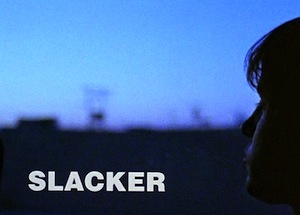 So here then was Richard Linklater, the guy who played sports at his high school in Huntsville, Texas, the guy who never really considered he'd be a filmmaker. After a stint on an oil rig, he putzed around the college scene in Austin, auditing a UTA class when he felt the need to fill in the gaps from the books and movies he was reading and watching on his own. He started the Austin Film Society, now an important cultural staple of the city, and started to play around with making movies himself. To call Linklater the slacker of early 90s indie directors is a compliment then, for when I say slacker I mean free-thinker. And there's no better indication of that then Linklater's second feature and breakout film... Slacker.
So here then was Richard Linklater, the guy who played sports at his high school in Huntsville, Texas, the guy who never really considered he'd be a filmmaker. After a stint on an oil rig, he putzed around the college scene in Austin, auditing a UTA class when he felt the need to fill in the gaps from the books and movies he was reading and watching on his own. He started the Austin Film Society, now an important cultural staple of the city, and started to play around with making movies himself. To call Linklater the slacker of early 90s indie directors is a compliment then, for when I say slacker I mean free-thinker. And there's no better indication of that then Linklater's second feature and breakout film... Slacker. Although festival masterminds and film critics like Roger Ebert and Vincent Canby found something intriguing and exciting in the film Slacker, slacker as a word was seen as something of a negative in the media of that time. As such Slacker was labeled as a film for and about 'Generation X', which is in large measure amusing for Linklater himself was at the tail end of the baby boomers. Linklater himself would later say in the commentary for the Criterion edition of the film that he used the word in an affection manner, and never felt that the denizens of his film were lazy or apathetic people, they just chose to strike out on very non-traditional paths compared to most of the population. Indeed if one looks at the film today its wandering philosophical debutants of Austin's counter culture (equally grunge and folk or metal as coming from no scene at all) feel just as fresh and exciting, if not possibly more so considering the backdoor compliance to consumerism that befalls the current hipster. Composed in what almost feels like one long, fluid take, the camera bobbing along the river that is the collective unconsciousness of Austinites, Slacker is visually impressive for its acute simplicity and preciseness. To this day, Linklater's technique is never showy nor flashy (even in his far-out animated projects), but to call his images dull is the ultimate misstep in how to look at his pictures. Like Nouvelle Vague-er Eric Rohmer, there is a no-nonsense nature to Linklater's compositions, as if he is making sure there is enough space for his characters and all their multicolored thoughts and feelings to fit on screen with enough space left over for us to stand side by side with them. His images account for the existential in a way that is rarely abstract, surreal or fantastic. So yes, while they may appear to be more or less practical in nature, that should not mean we are taking them in without wonder. Linklater is a craftsman who builds minimalist structures which house complex constructs, often on the everyday, if strange, beguiling and even miraculous nature of life itself.
Slacker itself, along with Soderbergh's Sex, Lies And Videotape has long been cited as the film to truly spark the American independent movement of the 90s, and despite Linklater's next film Dazed and Confused essentially being a modestly budgeted studio picture, the filmmaker would stay true to his roots throughout his career. It is not my point to argue that some of his contemporaries did not also do this. The main reason the indie seemed to shift in the 90s is because this DIY attitude bled into the studio system a bit, just like a more auteur attitude took hold in the early 70s. But enough generalizations... My main conceit today is to merely talk about Linklater, the filmmaker from this era who means the most to me.
Let's fast forward to the summer of 2004. I am 20 years old. I watch a lot of movies. In the past year alone I've fallen in love with Ingmar Bergman, Hayao Miyazaki and Tom Tykwer -- names that almost seem quaint, perhaps even trite to my ears now. I spend that summer in Tucson, Arizona, mulling over the idea of heading out to Los Angeles and to film school.
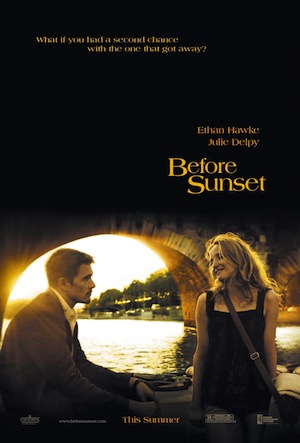 This was the heyday of Netflix... on disc. With three DVDs out at a time I always made sure to watch 'em and return 'em within 48 to 72 hours, which meant 12 to 15 titles a month. Less than that and I wouldn't be getting my money's worth. I had just finished a string of Godard pictures, which at the time left a rather bad taste in my mouth. Passing by one of two arthouses in Tucson I saw a poster for a film called Before Sunset. It was a simple poster with thirty-somethings Ethan Hawke and Julie Delpy: actors I recognized from such things as Gattaca, Dead Poet's Society and vaguely Kieslowski's White (if perhaps also the abysmal An American Werewolf in Paris). They sat on a boat, floating on what appeared to be the Seine -- How picturesque! Delpy looking pleased with herself; Hawke bent forward in an almost pensive fashion. It looked like a French film, but was not.
This was the heyday of Netflix... on disc. With three DVDs out at a time I always made sure to watch 'em and return 'em within 48 to 72 hours, which meant 12 to 15 titles a month. Less than that and I wouldn't be getting my money's worth. I had just finished a string of Godard pictures, which at the time left a rather bad taste in my mouth. Passing by one of two arthouses in Tucson I saw a poster for a film called Before Sunset. It was a simple poster with thirty-somethings Ethan Hawke and Julie Delpy: actors I recognized from such things as Gattaca, Dead Poet's Society and vaguely Kieslowski's White (if perhaps also the abysmal An American Werewolf in Paris). They sat on a boat, floating on what appeared to be the Seine -- How picturesque! Delpy looking pleased with herself; Hawke bent forward in an almost pensive fashion. It looked like a French film, but was not.I did my research and found out that this was in fact a sequel to a 1995 film called Before Sunrise; a film my friend and mentor, filmmaker Brooks Elms would later tell me was a turning point for him as a storyteller. In fact it was such a turning point for Brooks that he sent Linklater a letter, to which the director replied to. Needless to say I was quite compelled to see this film, so within a matter of days there it was on my doorstep. I put it in the DVD player (such an odd thing to say nowadays isn't it?) and sat back. What unfolded on screen to me was something of a marvel. Celine and Jesse's romantic and existential jaunt through Vienna was something so fresh and exciting to my little 20-year old mind, and yet something so familiar. As they unfurled their lives to each other over a matter of hours in that city, something wonderful and true stirred in me. This was the first time in a movie that I experienced people who thought and spoke like me! My heart soared at the way these 23-year olds' conversation mingled metaphysics with art, or the way they compared their own childhoods with the society-at-large. Both young people had a discerning eye, but were not bitter, or if they held a grudge they could talk it out. I felt an instant connection to everything this movie stood for, everything this movie talked about. I felt a deep gratitude and affection for everyone involved in its making. Consider this perfect timing as Before Sunset was due for a second run at The Loft Cinema after a lackluster week across town at the now-defunct theater that I have forgotten the name of.
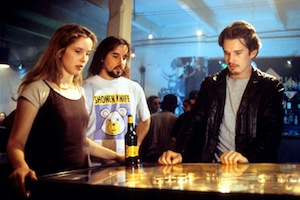 A second viewing of Before Sunrise came with my immediate family and then within the week we were seated for Before Sunset. The second film struck me like the back-hand of a bitter friend, feeling betrayed by a mistake that will remain largely unknown across the years. I was elated, perplexed, inflated, deflated, infused and diffused by how bitter and jaded and "real" Jesse and Celine had become in the nine years since they had last met. What had become of my friends? Had they grown up, grown weary, grown old before they even found a gray hair on their heads? No, they had gained experience, saw the coming bumps in the road. They were as honest and forthright, fearful, fanciful, furious and funny as ever.
A second viewing of Before Sunrise came with my immediate family and then within the week we were seated for Before Sunset. The second film struck me like the back-hand of a bitter friend, feeling betrayed by a mistake that will remain largely unknown across the years. I was elated, perplexed, inflated, deflated, infused and diffused by how bitter and jaded and "real" Jesse and Celine had become in the nine years since they had last met. What had become of my friends? Had they grown up, grown weary, grown old before they even found a gray hair on their heads? No, they had gained experience, saw the coming bumps in the road. They were as honest and forthright, fearful, fanciful, furious and funny as ever. Still, my 20-year old self wasn't quite yet able to handle these now 32-year olds' rather crustier intensity. I was a young man who lived largely in a day dream world, a straight-laced kid who preferred walking for hours on end in whatever city or suburb or countryside I was in to largely anything else in life, except, of course, for talking about and watching movies. The notion of meeting a woman -- perhaps your very soulmate -- on a train at the tail end of a melancholy journey across Europe appealed to me more than any other romantic notion out there. This scenario indeed seems ideal to many young men, or perhaps it just runs deep in the circles I find myself running in. Is that to say then that Before Sunrise in particular is a movie fueled by the heterosexual male romantic fantasy-supreme? No, not in the slightest. For at his most curious, at his most truthful, Linklater is, as much as he is a dreamer, some kind of realist. I don't mean that in the traditional sense of the word. Linklater's realism accepts and indeed embraces all the fanciful notions of young men and young women as, in fact, a part of reality. For we would not have any reality, built, or partially built, without dreams... however fanciful. Though Jesse and Celine are caught up in a scenario that is indeed made for the movies, they're acutely aware of how absurd and fantastic it really is, and thus, just how exceptionally real and fleeting this all must be; it's better than a dream, it's life. The second film confirms this with all the thorny bits sharpened.
And now, what Before Midnight confirms to me the most is that, from my own romantic mind, men, in large part, are much more romantic in their thinking than women are. They idealize and expound upon the world in often gauzy, naive, if aggressive fashion. They're stubborn and clear-sighted in their love. And yet... aren't women like this too, in their own hard-to-fathom way?
Right before I sat down to watch Before Midnight in a theater I had never stepped foot in, in a part of Los Angeles I had never been to prior to that afternoon, I ran into Brooks Elms -- right there on the street corner. He had just come from seeing the movie with his wife, and when I asked how he found the film he let out, in that sparkly exuberance I've come to know him by, that it was the best film he had ever seen. I let loose a big smile and laughed. I wasn't surprised by his answer. Brooks is as genuine a person as I have ever experienced. There were no falsehoods or hyperbole in his statement. For Brooks is the exact same age as Jesse and Celine in Before Midnight, and the sensibilities of Richard Linklater are the closest to his own as a storyteller. I was delighted by his truth and even more keen to see the film myself.
As I took my seat in that theater full of strangers, I knew we were all there to meet old friends. The lights dimmed and the hairs on the nape of my neck and backs of my arms stood on end. The air around me suddenly became crisper, cleaner. My breath deepened.
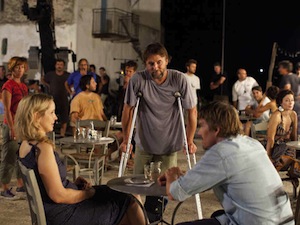 After writing so much, god forbid I now go into a full review of Before Midnight. Besides we already have Ryland Aldrich's excellent review in the vaults. Although I am inclined to tell you to read nothing concrete on the plot of the film as it is best to know nothing more than that it's been another nine years since we last encountered Jesse and Celine. But I will say a little more on my experience with the film, sans plot. Before Midnight is perhaps the best film I have seen on the joys of sharing a story and the agonies faced in one's own self-narrative. For someone who cannot experience 3D movies because of limitations in his eyesight, Before Midnight may also be the best 3D film I have ever seen. For Celine and Jesse aren't just characters to me, they're people I actually care about, leaping off the screen in such vivid and vibrant detail and nuance; they are reflections of myself and everyone I know at their most aspirational, greatest, harshest and most loving.
After writing so much, god forbid I now go into a full review of Before Midnight. Besides we already have Ryland Aldrich's excellent review in the vaults. Although I am inclined to tell you to read nothing concrete on the plot of the film as it is best to know nothing more than that it's been another nine years since we last encountered Jesse and Celine. But I will say a little more on my experience with the film, sans plot. Before Midnight is perhaps the best film I have seen on the joys of sharing a story and the agonies faced in one's own self-narrative. For someone who cannot experience 3D movies because of limitations in his eyesight, Before Midnight may also be the best 3D film I have ever seen. For Celine and Jesse aren't just characters to me, they're people I actually care about, leaping off the screen in such vivid and vibrant detail and nuance; they are reflections of myself and everyone I know at their most aspirational, greatest, harshest and most loving. It is perhaps not that important to wonder if Before Midnight is just the latest entry in what is to be a long running series or the fabulous ending to a beautiful trilogy, for as they are each film works wonderfully on their own merits. And yet as a whole, as a tapestry taken across years, across decades, Linklater, Delpy, Hawke and their collaborators have tapped into the very essence of what cinema can do to us and for us. Cinema keeps us healthy. It keeps us learning; keeps us curious. It keeps us growing. Celine and Jesse will remain the same, and yet they've already grown up, and will grow even more. So whether we see them again or not, they're not done yet, because we aren't either.
What's fascinating about the Linklater of today versus the Linklater of the Slacker era, is that not much has changed in the filmmaker, and yet everything has, in large part because of the American cinematic landscape he helped to broaden. On a practical level, he's been able to balance experimental projects like A Scanner Darkly and Tape with more traditional fare like Me And Orson Welles. At his most straight-forward, Richard Linklater is fascinated by people. Most of his films expound upon the quest of the individual as much as they do various forms of community. He remains a resident of Austin, Texas, and for the most part works with a tight-nit group of collaborators (Hawke alone has been in seven of Linklater's features and will be appearing in the long-in-production Boyhood down the line). This is all very well and good, and very encouraging for young filmmakers who find themselves perhaps aghast in the shifting sands of the industry today. To me, to someone who takes in the world just as much with his heart as he does his head, it is Linklater's sensitivity and inquisitiveness, his child-like wonder and glee, his equal parts tempered and elated intellectualism that makes me feel and makes me think he will remain a vital and important filmmaker for years to come. If anything then I do not idolize this man but recognize him as a kindred spirit. Which, considering the communal nature present in many of his films, feels like a far, far healthier attitude for me to hold dear.
Before Midnight will expand across the U.S. in the coming weeks, and will be in most parts of Europe by the end of June. Check your local listings for exact dates.
Indie Beat is an alternative look at the wide-ranging world of independent cinema.

Do you feel this content is inappropriate or infringes upon your rights? Click here to report it, or see our DMCA policy.






